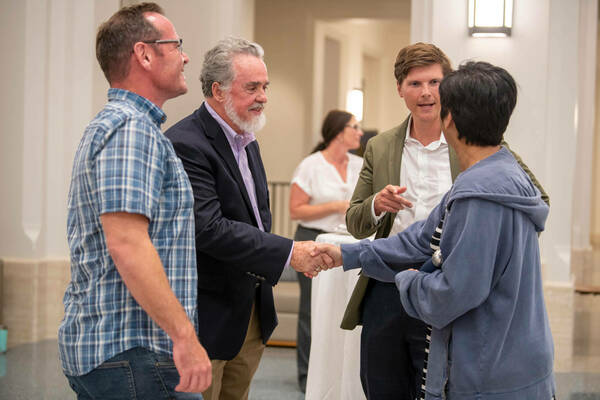
 Center from Left: Ray Offenheiser, director, and Michael Sweikar, executive director, greet two of NDIGD’s inaugural Faculty Fellows.
Center from Left: Ray Offenheiser, director, and Michael Sweikar, executive director, greet two of NDIGD’s inaugural Faculty Fellows.
The Notre Dame Initiative for Global Development (NDIGD)—an integral part of the Keough School of Global Affairs at the University of Notre Dame—has launched its new NDIGD Faculty Fellows program, with 100 interdisciplinary Notre Dame faculty committed to five-year terms through 2024.
The inaugural class of NDIGD Faculty Fellows hold primary appointments in over 23 different departments within seven of Notre Dame’s colleges and schools. Each NDIGD Faculty Fellow has individual expertise in one or more of NDIGD’s five domains of thematic focus: Sustainability; Humanitarianism; Effective States and Development; Business in Development; and Global Health. A full list of current NDIGD Faculty Fellows is available here.
As part of the program, these NDIGD Faculty Fellows will have an increased amount of involvement with NDIGD programs and personnel, and collaborate frequently or more deeply on NDIGD projects or programs, or coursework in the Keough School of Global Affairs. The program is designed to provide several unique, tangible benefits to NDIGD Faculty Fellows through collaborative opportunities; premier access to NDIGD expert practitioners; and connections to research, grant opportunities, travel, and worldwide partnerships.
The new NDIGD Faculty Fellows program was officially launched at an afternoon reception on Tuesday, September 24, in The Forum of Jenkins Nanovic Halls. See more photos from the reception on NDIGD’s Facebook page. At the event, Michael Sweikar, NDIGD’s executive director, and Ray Offenheiser, NDIGD’s director and a distinguished professor of the practice in the Keough School, outlined their vision for the program.
“In the eight years since our founding, NDIGD has worked on over 100 global development projects with over 150 Notre Dame faculty. Our programs have spanned over 60 countries and helped bring over $46 million in grant and contract awards to Notre Dame to work on issues related to global poverty and inequality,” said Sweikar. “From the very beginning, I have viewed NDIGD as a team of bridge-builders. Our team understands academia intimately but also brings decades of collective global practitioner experience to the table to help apply academic research on-the-ground, in the field, and to help others.”
“We want to leverage the rich resources of the University and give profile to the important work of our research community at fora and throughout the development community, where it can have an impact. However, we can only be as ambitious on these issues as the partnerships we can build and the faculty that support our work,” said Offenheiser. “We invite you to think big, imagine boldly, and do not hesitate to come to us with your ideas. We want to help you find opportunities that will enable you to achieve your professional goals and, perhaps, open entirely new frontiers of research that you may never have imagined were available before.”
Supervisors interested in nominating direct reports for the program should contact Edward Jurkovic at ejurkovi@nd.edu, or (574) 631-9856. Individuals who wish to submit self-nominations should also contact Edward Jurkovic. Additional information about the program, including the responsibilities of NDIGD Faculty Fellows and eligibility criteria, is available at ndigd.nd.edu/FacultyFellows.
The Notre Dame Initiative for Global Development (NDIGD)—an integral part of the new Keough School of Global Affairs at the University of Notre Dame—works to address global poverty and inequality through policy, practice, and partnership.
Contact: Luis Ruuska, communications specialist, Notre Dame Initiative for Global Development, lruuska@nd.edu
Originally published by at ndigd.nd.edu on September 30, 2019.